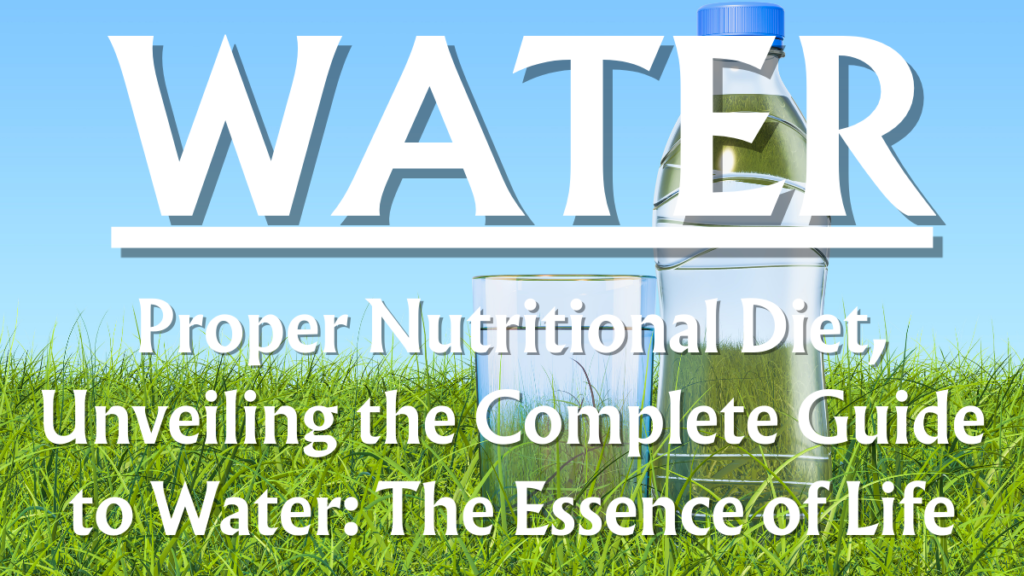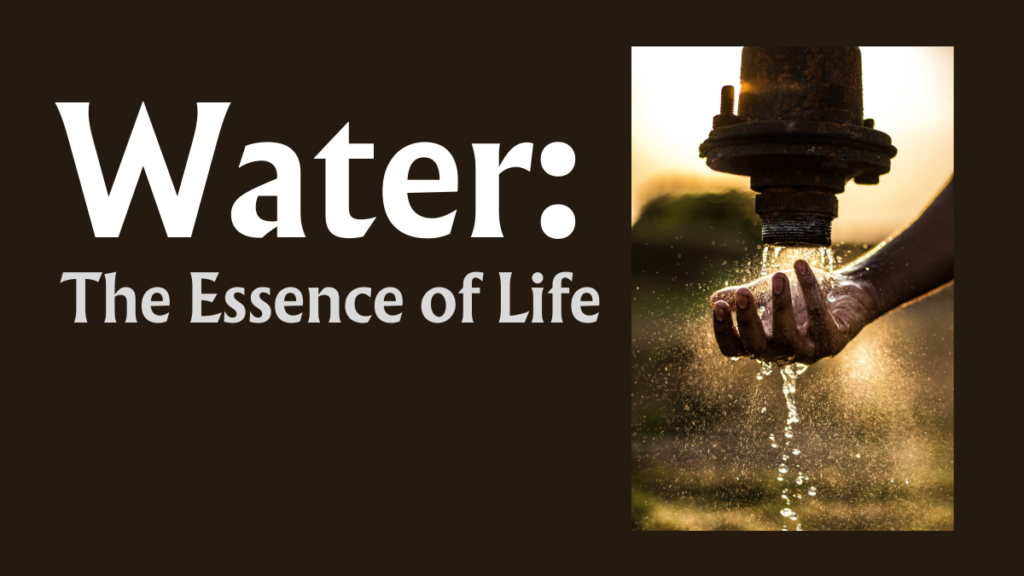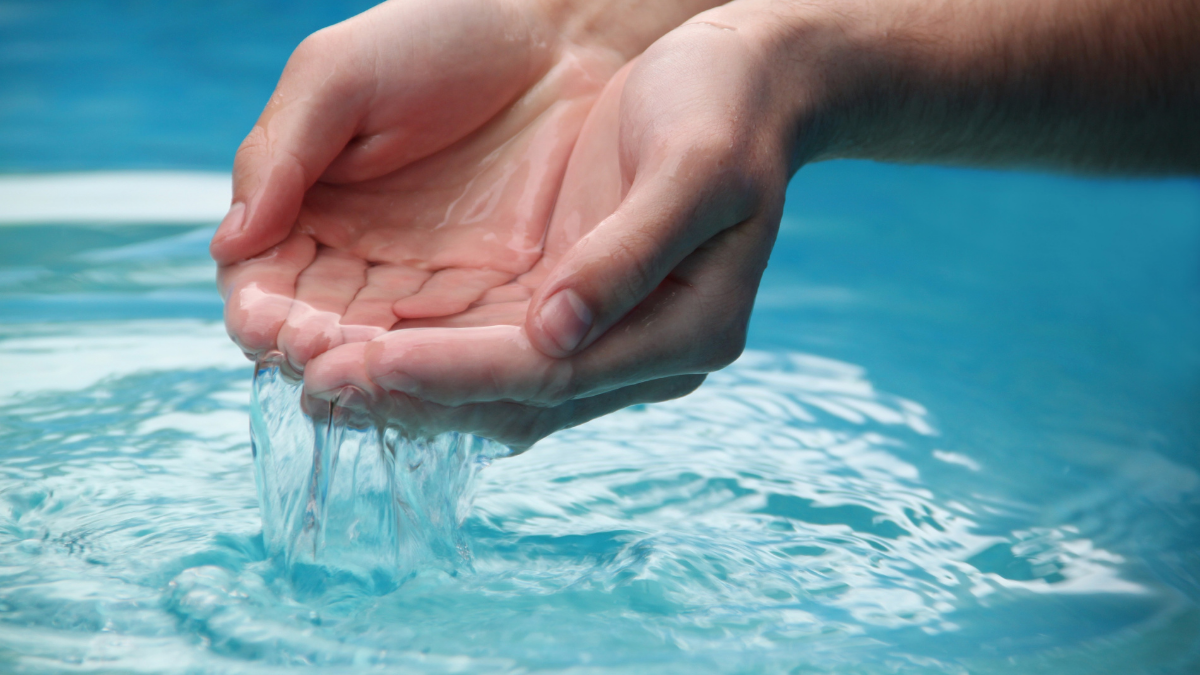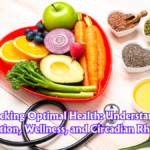Proper Nutritional Diet, Unveiling the Complete Guide to Water: The Essence of Life (Part 12/15)
Water, the elixir of life, plays an unparalleled role in sustaining every facet of our existence. From nurturing our bodies to shaping the landscapes around us, the significance of water is profound. Let’s embark on a comprehensive journey to explore the various dimensions of water, its vital role in our health, and practical tips to ensure optimal hydration.

1. Understanding the Essence of Water
Definition of Water:
– Water is a transparent, tasteless, and odorless liquid essential for all known forms of life.
Chemical Composition:
– H₂O: Two hydrogen atoms bonded to one oxygen atom.
Forms of Water:
– Liquid, solid (ice), and gas (water vapor).

2. The Role of Water in the Human Body
Hydration and Cells:
– Water constitutes a significant part of cells, maintaining their structure and facilitating biochemical reactions.
Temperature Regulation:
– Sweating and evaporation help regulate body temperature, preventing overheating.
Nutrient Transportation:
– Water aids in the transportation of nutrients, ensuring proper distribution throughout the body.
Joint Lubrication:
– Synovial fluid, composed mostly of water, lubricates joints for smooth movement.
Detoxification:
– Water is crucial for kidney function, facilitating the elimination of waste and toxins.

3. Hydration Needs and Recommendations
Daily Water Intake:
– The “8×8” rule suggests drinking eight 8-ounce glasses of water daily, but individual needs vary.
Factors Influencing Hydration:
– Physical activity, climate, age, and health conditions impact hydration requirements.
Signs of Dehydration:
– Thirst, dark urine, dry skin, fatigue, and dizziness are indicators of dehydration.

4. Sources of Hydration
Water-rich Foods:
– Fruits (watermelon, oranges), vegetables (cucumbers, celery), and soups contribute to hydration.
Beverages:
– Water is the best choice, but herbal teas and diluted fruit juices can also hydrate.
Avoiding Dehydrating Drinks:
– Limit the intake of caffeinated and alcoholic beverages, which can contribute to dehydration.
5. Water Quality and Safety
Tap Water:
– Most tap water is safe for consumption, but water quality can vary. Consider using filters if needed.
Bottled Water:
– Ensure the source and quality of bottled water, and consider its environmental impact.
6. Tips for Optimal Hydration
Carry a Reusable Water Bottle:
– Make it convenient to stay hydrated by carrying a reusable water bottle wherever you go.
Set Hydration Reminders:
– Use technology or routine triggers to remind yourself to drink water regularly.
Infuse with Flavors:
– Add natural flavors like lemon or cucumber to make water more enjoyable.
Conclusion: The Pinnacle of Wellness
Water is not merely a beverage; it is the cornerstone of vitality and well-being. By understanding its role, staying mindful of hydration needs, and adopting healthy habits, we can harness the life-giving power of water for optimal health. So, let the clear, refreshing stream of water flow through your daily life, nurturing your body and invigorating your spirit. Stay hydrated, stay vibrant!
FAQs about Water: Quenching Your Curiosity
1. Why is water important for the body?
– Water is crucial for cell function, temperature regulation, nutrient transportation, joint lubrication, and detoxification.
2. How much water should I drink daily?
– Daily water intake varies, but a common recommendation is eight 8-ounce glasses per day. Individual needs depend on factors like activity level and climate.
3. Can I meet my hydration needs through other beverages?
– While water is the best choice, herbal teas and diluted fruit juices can also contribute to hydration. Limit caffeinated and alcoholic beverages.
4. What are the signs of dehydration?
– Signs include thirst, dark urine, dry skin, fatigue, and dizziness.
5. Is tap water safe to drink?
– In many areas, tap water is safe, but water quality can vary. Consider using filters if needed.






